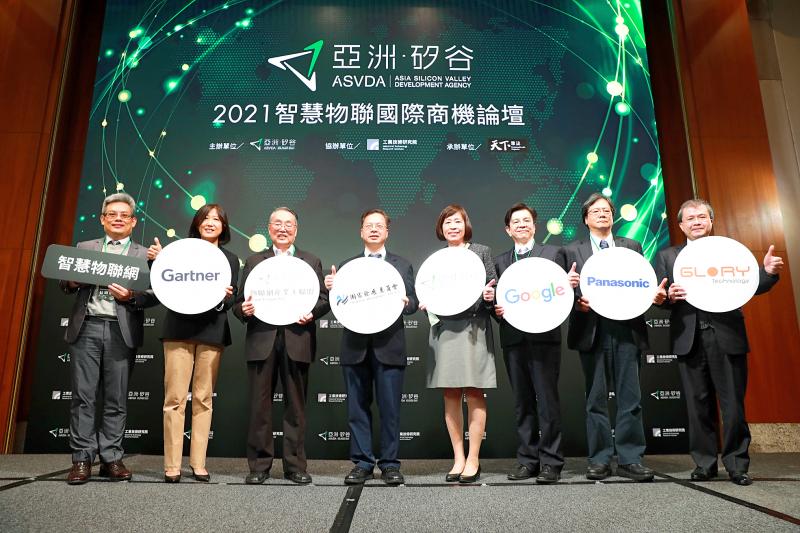Taiwan’s artificial intelligence of things (AIoT) market might have exceeded NT$1.47 trillion (US$51.7 billion) last year and is set for fast growth this year and beyond, as 5G and other new technologies take off, National Development Council Minister Kung Ming-hsin (龔明鑫) said yesterday.
“AIoT businesses should have surpassed NT$1.47 trillion last year, growing rapidly after hitting NT$1 trillion in 2018,” Kung told an AIoT forum in Taipei to underscore the government’s support for the industry.
The government in September 2016 set up an Asian Silicon Valley Development Agency as part of an attempt to build Taiwan into a regional technology hub, Kung said.

Photo courtesy of Asia Silicon Valley Development Agency
The endeavor highlights the promotion of an AIoT platform, and the establishment of a friendly and creative ecosystem, he said.
The Asian Silicon Valley project is entering its second stage this year, allowing AIoT deployments to bear fruit with help from 5G infrastructure, Kung said.
The government would lend support by channeling funds into the realization of smart living, he said.
Toward that goal, about NT$95 billion from the Forward-looking Infrastructure Development Program would be used to build digital households and another NT$49 billion on improving 5G infrastructure, Kung said.
Related businesses — such as 5G and AI solutions — are huge and ready to begin exports once the COVID-19 pandemic comes under control, likely in the second half of this year, he said.
Council Deputy Minister Kao Shien-quey (高仙桂) shared the optimistic sentiment, saying that international technology giants Alphabet Inc, Microsoft Corp, Amazon Web Services and Cisco Systems Inc have set up innovation or research and development facilities in Taiwan.
To help local firms, the council on Monday approved a NT$600 billion budget plan to fund public construction projects this year.
Part of the funding, NT$27.26 billion, would be used to expand and renovate factories in the Hsinchu Science Park (新竹科學園區), expanding their floor space from 53,702m2 to 366,004m2 so that they can house 196 units, from the current 88 units, the council said.
The renewal project would not need to evacuate tenants or disrupt their operations, it said.
The council also approved plans to expand the export zone in Pingtung County to meet the needs of companies returning from abroad.
The expansion project would add 26.7 hectares to the zone and create 790 jobs, it said.
In addition, the council approved a dredging project for the Zengwen Reservoir (曾文水庫) in Chiayi County to ensure stable and sufficient water supply in southern Taiwan, it said.

The New Taiwan dollar is on the verge of overtaking the yuan as Asia’s best carry-trade target given its lower risk of interest-rate and currency volatility. A strategy of borrowing the New Taiwan dollar to invest in higher-yielding alternatives has generated the second-highest return over the past month among Asian currencies behind the yuan, based on the Sharpe ratio that measures risk-adjusted relative returns. The New Taiwan dollar may soon replace its Chinese peer as the region’s favored carry trade tool, analysts say, citing Beijing’s efforts to support the yuan that can create wild swings in borrowing costs. In contrast,

Nvidia Corp’s demand for advanced packaging from Taiwan Semiconductor Manufacturing Co (TSMC, 台積電) remains strong though the kind of technology it needs is changing, Nvidia CEO Jensen Huang (黃仁勳) said yesterday, after he was asked whether the company was cutting orders. Nvidia’s most advanced artificial intelligence (AI) chip, Blackwell, consists of multiple chips glued together using a complex chip-on-wafer-on-substrate (CoWoS) advanced packaging technology offered by TSMC, Nvidia’s main contract chipmaker. “As we move into Blackwell, we will use largely CoWoS-L. Of course, we’re still manufacturing Hopper, and Hopper will use CowoS-S. We will also transition the CoWoS-S capacity to CoWos-L,” Huang said

VERTICAL INTEGRATION: The US fabless company’s acquisition of the data center manufacturer would not affect market competition, the Fair Trade Commission said The Fair Trade Commission has approved Advanced Micro Devices Inc’s (AMD) bid to fully acquire ZT International Group Inc for US$4.9 billion, saying it would not hamper market competition. As AMD is a fabless company that designs central processing units (CPUs) used in consumer electronics and servers, while ZT is a data center manufacturer, the vertical integration would not affect market competition, the commission said in a statement yesterday. ZT counts hyperscalers such as Microsoft Corp, Amazon.com Inc and Google among its major clients and plays a minor role in deciding the specifications of data centers, given the strong bargaining power of

TARIFF SURGE: The strong performance could be attributed to the growing artificial intelligence device market and mass orders ahead of potential US tariffs, analysts said The combined revenue of companies listed on the Taiwan Stock Exchange and the Taipei Exchange for the whole of last year totaled NT$44.66 trillion (US$1.35 trillion), up 12.8 percent year-on-year and hit a record high, data compiled by investment consulting firm CMoney showed on Saturday. The result came after listed firms reported a 23.92 percent annual increase in combined revenue for last month at NT$4.1 trillion, the second-highest for the month of December on record, and posted a 15.63 percent rise in combined revenue for the December quarter at NT$12.25 billion, the highest quarterly figure ever, the data showed. Analysts attributed the